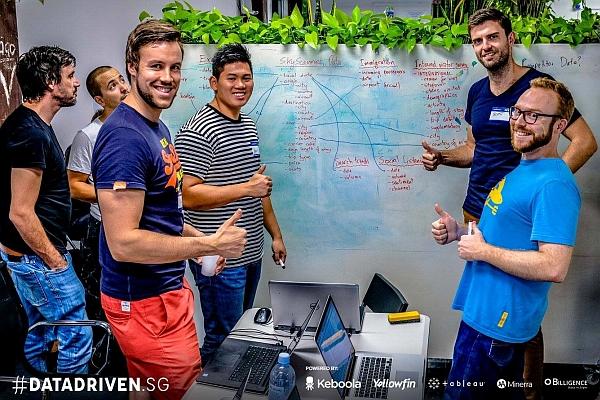Published on the 17/03/2017 | Written by Anthony Caruana

Mix developers, pizza and beer: await genius. But what happens if you add screeds of real data and some smart analytics tools?…
That’s what Datadriven.sg recently did, putting 20 teams of five members from the “data junkie” community together to solve the problems faced by all sorts of travellers – everyone from the seasoned business veteran to backpackers. The data fix came from online travel marketplace Skyscanner and was spruiked with tooling from Australian BI vendor Yellowfin, arch rival Tableau, and Keboola, a provider of cloud-based data manipulation software.
The hackathon, held in Sydney over the weekend of 25-26 Feb, immersed attendees in 48 hours of complex data analysis, visualisation and predictive data science. The datadriven.sg event is a concept that grew out of a Singapore-based group of Keboola enthusiasts – hence the ‘.sg’. Analytics vendors and commercial sponsors (including life insurer TAL who’s analytics team also participated), sniffing a growing community initiative, have got on board to enable its wider rollout.
Most hackathons start with a specific problem set, or set of questions to answer. But this one didn’t limit or direct the problems people were exploring. Instead, it was an open playground that saw creative takes on data discovery and interesting interpretations using data provided by online travel service Skyscanner.
“The whole point is to engage the ‘data junkie’ community we are a part of,” said Pavel Bulowski, co-founder of DataDriven.SG. “It is not easy to get 100 people to invest their entire weekend into an event like this, but in tech or data analytics specifically, what is often overlooked is that the practitioners have passion for what they do. They are keen to try new tools in the market, get their hands on data, and delve into problems they normally don’t encounter at work.”
By not starting with a specific set of questions for the hackathon participants to answer the scene was set for freeing up creativity in the context of real life data and a scenario that everyone can relate to – the travel experience.
For example, some of the teams considered how seasonality affects prices and tried to work out the best tactic for getting the optimal price on flights.
But, said Bulowski, ‘really interesting’ trends started to emerge when people took to combining data sources. “For example, we introduced lots of govtech data into the equation, so people were contrasting levels of income and market shares of low-cost airlines.”
Unlike many hackathons which reward winners of the best idea or implementation, the results of this activity aren’t going to be used immediately. Instead, Bulowski said the company is looking to collaborate with local companies who will benefit from this ‘fresh look’ at their data. In this instance, Skyscanner will benefit through having new perspectives to use in improving customer experience.
“Importantly, it was the community that made this work. It was not a networking event, but the network really is a big part of it. During work on a project and in a team, people make new friends and there is lot of knowledge rub off,” said Bulowski.
Running in tandem with the Datadriven.sg were Australia’s first two ‘Data Girls’ events held in Sydney and Melbourne. Bringing together more than 100 women for fast-paced days of analytics education, the events were tailored to budding data scientists. The intent was to encourage more women to embrace a career in data analytics.



























